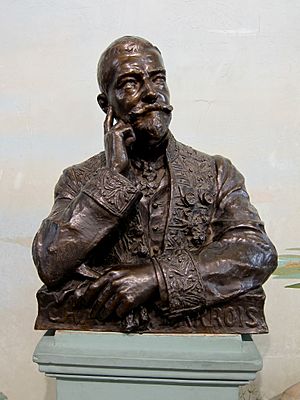Charles Barrois facts for kids
Charles Eugene Barrois (born August 21, 1851 – died November 5, 1939) was an important French geologist and palaeontologist. Geologists study the Earth's rocks and history. Palaeontologists study ancient life, like fossils.
Early Life and Education
Charles Barrois was born in Lille, France. He went to the Jesuit College of St Joseph in Lille. There, he learned about geology from Professor Jules Gosselet. This early learning helped him become a great scientist.
Discoveries and Career
Barrois's first big work was a study about the Cretaceous period rocks in England and Ireland. The Cretaceous period was a time when dinosaurs roamed the Earth. In his study, published in 1876, he carefully mapped out different rock layers. He also identified the fossils found in them. His work became a guide for other scientists.
In 1876, Barrois joined the French Geological Survey. This group maps the Earth's surface and underground. A year later, in 1877, he became a geology professor at the University of Lille.
Barrois studied many different types of rocks and fossils. He explored Cretaceous rocks in the Ardennes and Spain. He also looked at older rocks from the Devonian and Palaeozoic eras in Brittany, France, and northern Spain. He was skilled at understanding rocks (a petrologist) and finding fossils. He was also a great field geologist, meaning he did a lot of his research outdoors.
Awards and Recognition
Charles Barrois received many awards for his important work.
- In 1881, he was given the Bigsby medal.
- In 1901, he won the Wollaston medal. Both awards came from the Geological Society of London.
- In 1904, he became a member of the French Academy of Sciences.
- He was also chosen as a Foreign Member of the Royal Society of London.
- In 1907, he helped create the Musée Houiller, a museum about Carboniferous rocks, in Lille.
Barrois's work was known all over the world. Many science groups in Europe and America honored him. He became a member of the American Academy of Arts and Sciences in 1915. He was also recognized by his own country. He received the Légion d'honneur, a high French award, at age 37. He was later made a commander of this order in 1923.
He passed away in St Genevieve-en-Caux and is buried in Lille.
Family Life
Charles Barrois had a brother named Jules Henri Barrois. Jules was also a scientist, but he studied animals (a zoologist).
 | Aurelia Browder |
 | Nannie Helen Burroughs |
 | Michelle Alexander |


